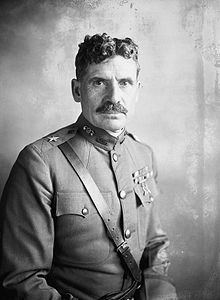Amos Fries
| Amos A. Fries | |
|---|---|

Brig. Genl. A. A. Fries, 8/5/1921
|
|
| Born |
March 17, 1873 Viroqua, Wisconsin |
| Died | December 30, 1963 (aged 90) Washington, D. C. |
| Place of burial | Arlington National Cemetery |
| Allegiance | United States of America |
| Service/branch | United States Army |
| Years of service | 1898–1929 |
| Rank | Major General |
| Commands held |
1st Gas Regiment, Chemical Warfare Service |
| Battles/wars |
Philippine-American War World War I |
| Awards | Distinguished Service Medal |
| Other work | Author Road/Bridge construction - Yellowstone Park |
Amos Alfred Fries was a general in the United States Army and 1898 graduate of the United States Military Academy. Fries was the second chief of the army's Chemical Warfare Service, established during World War I. Fries served under John J. Pershing in the Philippines and oversaw the construction of the roads and bridges in Yellowstone National Park. He eventually became an important commander in World War I. After he retired from the Army in 1929, Fries wrote two anti-communist books. He died in 1963 and is buried in Arlington National Cemetery.
Amos Alfred Fries was born March 17, 1873 in Viroqua, Wisconsin. His family moved to Missouri after he was born and then moved to Oregon. Fries earned an appointment to the United States Military Academy and graduated there in 1898.
After graduating West Point Fries joined the Army Corps of Engineers and served in the Philippines during the Philippine-American War. During that time he saw combat under the leadership of Captain John J. Pershing, later the American Expeditionary Forces (AEF) commander during World War I. From 1914 to 1917 Fries oversaw the construction of roads and bridges in Yellowstone National Park; he gained some notoriety for that work.
Fries arrived in Europe as World War I raged, he expected to do more engineering work but was instead thrust into heading the fledgling Gas Service Section, AEF. The Gas Service Section was mostly constituted by the 1st Gas Regiment (originally the 30th Engineer Regiment (Gas and Flame)) and Fries commanded the section. He became the chief of the Overseas Division of the Chemical Warfare Service in 1919, and when William L. Sibert resigned in 1920 Fries became the first peacetime overall chief of the Chemical Warfare Service. He served at that post until he retired from the Army in 1929. For his work with the Chemical Warfare Service he was awarded the Distinguished Service Medal.
...
Wikipedia
